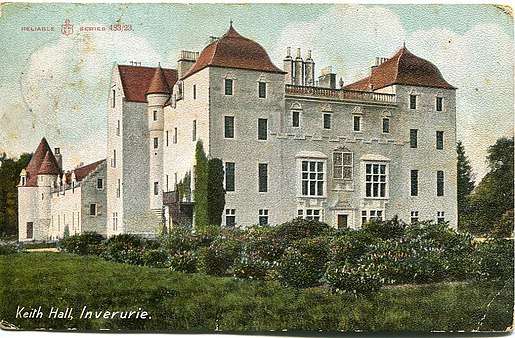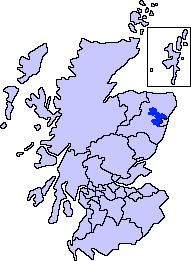Caskieben
Caskieben (/kæskiːˈbɛn/ kahs-KEE-ben; Scottish Gaelic: Gasach beinn "Wooded Hill")[1] Caskieben was a palisaded tower built by the Garviach family during the 12th-century Norman expansion into Scotland. It stood on a low, circular mound surrounded by a 2 metre deep, 15 metre wide moat.
| Caskieben | |
|---|---|
| Part of Keith Hall | |
| Aberdeenshire, Scotland | |
 Colorized photograph of Keith Hall (Caskieben) near Inverurie, Scotland. Postcard dated June 30th, 1909. | |
| Coordinates | 57.28203425°N 2.35334179°W |
| Grid reference | grid reference NJ 7879 2135 |
| Type | fortalice |
| Site information | |
| Owner | Lord Keith |
| Controlled by | Lord Keith |
| Condition | renovated |
| Site history | |
| Built | 1224 |
| Built by | Garvioch |
| Materials | Stone |
| Demolished | 1662 |
| Battles/wars | Battle of Inverurie (1308) |
This earlier wooden tower was superseded nearby by a 13th-century stone castle also named Caskieben at first, but later renamed Keith Hall.
Nothing now remains of a structure, but the mound and moat are still visible.[2]
History
About 1224 Norman de Leslie received the lands of Caskieben and was doubtless the builder of the Anglo-Norman castle which superseded the old tower (NJ72SE 40). The castle of Caskieben that was enlarged after 1662 by the addition of a Renaissance mansion in front, and renamed Keith Hall, was, however, a fine example of the Z-plan castle, a style which probably originated in the district.
Mither Tap has an astronomical alignment with Caskieben, the hill being due west. Dr. Arthur Johnston said[3] "the hill of Benochie, a conical elevation about eight miles distant, casts its shadow over Caskieben at the periods of the equinox."
References
- "Celtic place-names in Aberdeenshire : with a vocabulary of Gaelic words not in dictionaries ; the meaning and etymology of the Gaelic names of places in Aberdeenshire ; written for the Committee of the Carnegie Trust" "John Milne, 1912" Retrieved on 2015-03-19
- Andy Sweet "Caskieben (site of)", Caskieben, Retrieved on 2015-03-13
- Robert Chambers, Thomas Thomson "A Biographical Dictionary of Eminent Scotsmen, Volume 2","Arthur Johnston", published 1870
